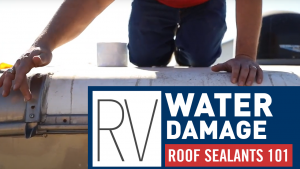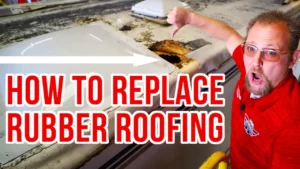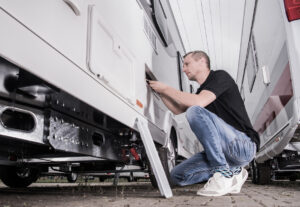The fresh water tank is a critical component of your RV — and a leak can be pretty stressful, especially if you’re on a camping trip and don’t have easy access to fresh water.
The good news is that, in many cases, it’s relatively easy to address a fresh water tank leak and get back on the road.
Find out what to do if you have a fresh tank leak (and how to prevent future leaks from happening) below.
Signs Your Fresh Water Tank Needs Repairs
In many cases, it’s obvious when you’re dealing with a fresh tank leak because you’ll notice water coming from it.
In some situations, though, leaks can be a bit slower and sneakier. In these instances, you might notice that your sensors show a decrease in water even if you haven’t been using any. If you’re not sure where all your water’s going, a leak is likely the culprit.
What to Do if You Have a Fresh Tank Leak
If you know you’re dealing with a fresh tank leak, you can take a few different steps to fix it. The following are some of the most effective DIY approaches:
Tighten or Replace Fittings
Sometimes, the solution to a fresh tank leak is as simple as adjusting or replacing the fittings. If water seems to be coming from the fittings — the rings that screw onto the tank — they might need to be tightened or replaced with a newer, better-fitting model.
Sealant
For small leaks or as a short-term solution, you can cover the opening with sealant to stop water from coming out. This is similar to using spray foam insulation as a temporary measure to fill a hole or crack in your house.
Keep in mind, though, that you must use a sealant that has been approved by the Food and Drug Administration (FDA) because anything you cover the leak with will be making contact with your drinking water (and you definitely don’t want to end up drinking anything that isn’t FDA-approved).
Plastic Strips
If your tank is made from plastic material, such as polyethylene or ABS (acrylonitrile butadiene styrene) plastic, you can use small plastic strips and a butane or propane torch to essentially weld the crack closed. Again, this approach is usually best for small cracks.
To do this, place the plastic strip over the whole (some recommend drilling small holes outside of the original hole and using them to slide the plastic strip into place). From here, heat up the torch and then melt the plastic strip over the hole until it’s fully sealed.
Be sure to wear a mask during this project so you don’t breathe in any harsh fumes.
Welding
If you have an aluminum or stainless steel water tank, you can follow a similar process to the one outlined above, but with metal and a welding torch. Keep in mind, though, that this approach is trickier and riskier than working with plastic, so unless you have previous experience, it’s better to let a professional handle it.
Epoxy Resin and Fiberglass
You can also repair a plastic tank with a combination of epoxy resin and a fiberglass patch.
Start by drilling a small hole on either side of the crack. Sand the area around the crack to allow for a good bond. Then, cut the fiberglass patch so it’s 1-2 inches larger than the crack (make sure it’s larger in all directions).
Combine the epoxy resin and its catalyst. Then, dab a layer over the sanded area. Lay the patch over the top and pat it with a brush until it’s soaked with resin. Continue adding resin until it looks glossy, then wait for it to harden (24 hours) before you refill the water tank.
When to Replace Your Fresh Water Tank
If you have a severe leak in your fresh water tank, if you’re not comfortable with any of the repair methods listed above, or if you’ve tried them and they haven’t been effective, it’s time to look into replacing the tank altogether.
A fresh water tank is a relatively inexpensive part to replace (some cost under $100). Many RV parts suppliers can deliver a new tank within a few days of ordering, too, so you can replace it and get on the road as quickly as possible.
Don’t know how to install a new fresh tank? No problem. Reach out to an RV repair professional, and they will set it up (and ensure it’s set up correctly) in no time.
How to Prevent Fresh Water Tank Leaks
It’s great that you now know what to do if you have a fresh tank leak. However, wouldn’t it be great if you never had to deal with a leak in the first place?
Here are some tips that can help you prevent fresh water tank leaks in the future:
Keep It Clean
A clean, well-cared-for fresh water tank is less likely to develop leaks.
A good rule of thumb is to clean your water tank with bleach or another heavy-duty cleaner at least once every six months. Doing so will prevent bacterial growth and, if you have a metal water tank, prevent corrosion, which increases your chance of dealing with leaks.
Inspect It Regularly
Regular cleaning also gives you an opportunity to inspect your water tank. Whenever you clean the tank, spend a little time examining it to look for potential leaks or other indicators that it isn’t functioning correctly.
Use an RV Cover
When you’re not using an RV, be sure to cover it with a specially designed RV cover. This cover will protect the RV from damage caused by sudden temperature changes, which can be particularly hard on water tanks.
Using an RV cover can also reduce your chances of needing other repairs, such as RV roof vent fan repair.
Schedule Regular Maintenance
Once a year, arrange for a professional to look over your RV and handle routine maintenance.
Regular maintenance, like regular cleanings, gives you a chance to learn about potential problems as soon as they arise and before they can escalate. It can also help to prevent a lot of common RV issues and reduce your need for expensive repairs.
Need More RV Repair Tips?
An RV fresh tank leak can be frustrating and overwhelming. Fortunately, you now know what to do to handle this issue and prevent it from happening again in the future.
Keep the tips shared above in mind so you can spot and take care of a leak as quickly as possible. Remember, too, that regular RV maintenance can play a big role in preventing leaks and other problems.
If you’re looking for expert RV maintenance, our team at Leisure Coachworks is here to help and make your RV living worry-free. Contact us today to learn more about our RV repair and upgrade services.





